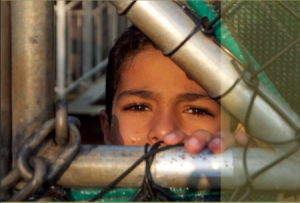Children in detention report attacks both sides of politics

Photo: Australian Human Rights Commission
More than 100 children committed self-harm, 30 reported sexual assault, nearly 30 went on hunger strike and more than 200 were involved in assaults in a 15-month period in Australian immigration detention, a damning new report from the Australian Human Rights Commission says.
The broad based inquiry into children in immigration detention report titled The Forgotten Children described immigration detention as “a dangerous environment” for children.
It found detention was inherently damaging for children, and that “prolonged detention is having profoundly negative impacts on the mental and emotional health and development of children”.
“At the time of writing this report, children and adults had been detained for over a year on average.”
There are currently more than 250 children in Australian immigration detention, including 119 on Nauru. More than 100 children, previously held on Christmas Island, have been released into the community on the mainland on bridging visas over the past fortnight.
The report, by the president of the Australian Human Rights Commission, Professor Gillian Triggs, said despite “the best efforts” of immigration department staff and contractors to properly care for children, detention was damaging children’s mental health, making them physically, sometimes chronically, sick, and cruelling their educations.
“It is the fact of detention, particularly the the deprivation of liberty and the high numbers of mentally unwell adults, that is causing emotional and developmental disorders amongst children,” the report said.
“Children are exposed to danger by their close confinement with adults who suffer high levels of mental illness. Thirty per cent of adults detained with children have moderate to severe mental illnesses.”
The report said that between January 2013 and March 2014, children in immigration detention were involved in: 128 incidents of actual self-harm; 171 incidents of threatened self-harm; 33 reports of sexual assault; 27 cases of voluntarily starvation or hunger strike.
Under international and Australian law, children are supposed to be detained only as a measure of “last resort”.
Australia is the only country in the world that mandatorily detains all unlawful non-citizens, including children.
“Some children have been detained for longer than 19 months because at least one of their parents has an adverse security assessment by Asio,” the report said. “The indefinite detention of these children raises special concerns for their physical and mental health, and their future life opportunities.”
Professor Triggs’ report cited evidence to the commission from the then immigration department secretary, Martin Bowles, who told an inquiry hearing the damage caused to children by detention was known to the department.
“There is a reasonably solid literature base which we’re not contesting at all which associates a length of detention with a whole range of adverse health conditions.”
In the report, Professor Triggs expressed disappointment that Australia had since regressed in its treatment of asylum seeker children.
“At the time of the previous national inquiry, the number of children in detention peaked at 842 children. In July 2013, just before the change of government, a record number of 1,992 children were in detention.”
Triggs condemned both Labor and Coalition governments for ignoring their stated commitments and legal obligations to protect children in their care.
“How had the gains that were so hard-fought at the time, and of which the Howard government were so rightly proud, disappeared?” she said.
“Triggs also said her commission was subject to “intense scrutiny and hostility” for conducting the inquiry.
Prime Minister Tony Abbott dismissed the report was a “blatantly partisan exercise” and the commission “should be ashamed of themselves”.
But UNICEF Australia hailed the report saying mandatory and indefinite detention of children exposed them to sexual violence and abuse, as well as causing significant mental and physical illness and developmental delays.
Laurie Nowell
AMES Senior Journalist












